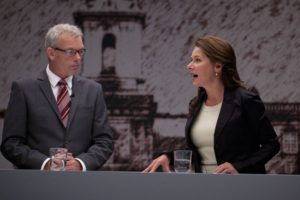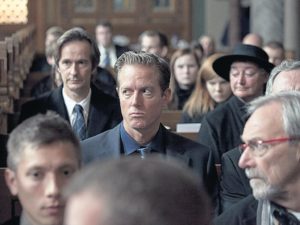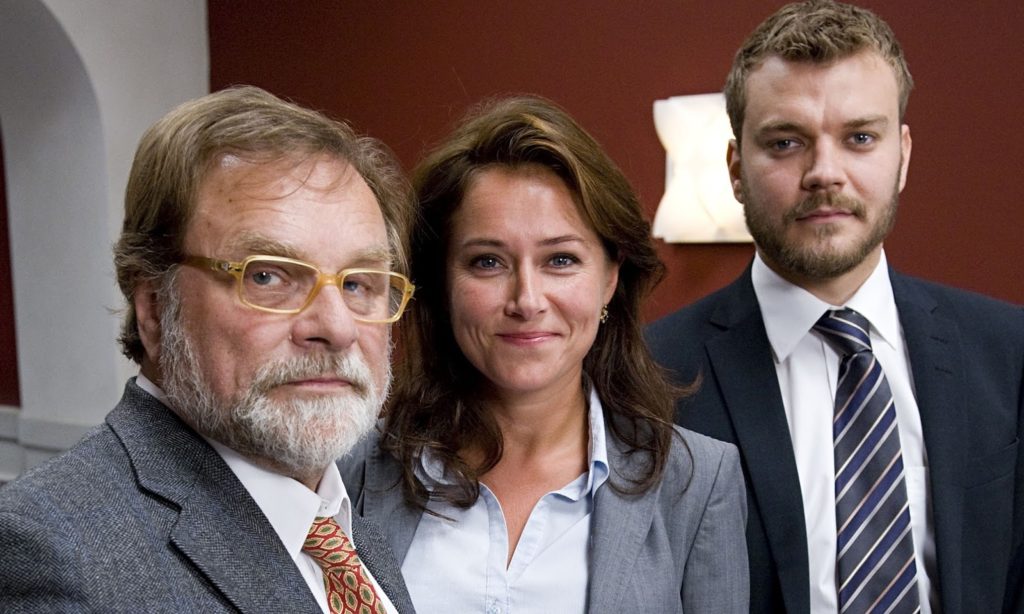Review: “Borgen”, art and life, who imitates who?
 Whoever accompanies this column knows that I love the Scandinavian series and movies, both for the differentiated content, for the creative approach and for a daring inconceivable in American productions. And best of all, it is not limited to the police genre, of which we have magnificent series such as “Bron/Broen” (SWE/DAN, 2011), but also about corporate corruption like “Bedrag” (DAN, 2016), press matters like “Pressa” (ICE, 2007), and political world, which is the case of “Borgen” (DAN, 2010).
Whoever accompanies this column knows that I love the Scandinavian series and movies, both for the differentiated content, for the creative approach and for a daring inconceivable in American productions. And best of all, it is not limited to the police genre, of which we have magnificent series such as “Bron/Broen” (SWE/DAN, 2011), but also about corporate corruption like “Bedrag” (DAN, 2016), press matters like “Pressa” (ICE, 2007), and political world, which is the case of “Borgen” (DAN, 2010).
“Borgen”, meaning castle or fortress in danish, was a series produced in Denmark between 2010 and 2013, being aired three seasons with ten episodes each. This series, considered one of the best of all time, has received numerous awards, among them, BAFTA, Monte Carlo and Biarritz, and many still claim to it has been suspended when it was at a peak of popularity.
 To give an idea, during the first season, the average number of viewers per episode in Denmark was 1.5 million. Considering Brazilian standards it may be small, but if we take into account that the entire population of the country is below six million inhabitants, this number is of great relative importance. This is even more curious as there are no action scenes, sex or other elements so common in the most popular series.
To give an idea, during the first season, the average number of viewers per episode in Denmark was 1.5 million. Considering Brazilian standards it may be small, but if we take into account that the entire population of the country is below six million inhabitants, this number is of great relative importance. This is even more curious as there are no action scenes, sex or other elements so common in the most popular series.
Borgen’s central character is Birgitte Nyborg (Sidse Babett Knudsen), a moderate party politician that fights inside Parliament’s intricacies to keep its country from extremism, and ensuring rights such as transparency, integration and equality. For this she has to face experienced politicians like Lars Hesselboe (Søren Spanning) and Svend Åge Saltum (Ole Thestrup), and also the aggressive journalist Michael Laugesen (Peter Mygind).
 Nyborg also has her allies, such as the faithful friend and mentor Bent Sejrø (Lars Knutzon), and her “spin doctor” Kasper Juul (Pilou Asbæk). Kasper is one of the most interesting characters of the series, with a tragic and mysterious past, manages to be the dark eminence of the Nyborg government, anticipating all the movements of her opponents. In the third season, Katrine Fønsmark (Birgitte Hjort Sørensen), a beautiful and ambitious journalist, gave up fame and money to join a political movement she believes in.
Nyborg also has her allies, such as the faithful friend and mentor Bent Sejrø (Lars Knutzon), and her “spin doctor” Kasper Juul (Pilou Asbæk). Kasper is one of the most interesting characters of the series, with a tragic and mysterious past, manages to be the dark eminence of the Nyborg government, anticipating all the movements of her opponents. In the third season, Katrine Fønsmark (Birgitte Hjort Sørensen), a beautiful and ambitious journalist, gave up fame and money to join a political movement she believes in.
Throughout the three seasons we have been following the rise and fall of Nyborg, who comes to occupy the post of prime minister of Denmark, although this ends up costing her marriage and even the health of her children. In fact, this is a differential of the series, where the protagonists are normal human beings, who have to deal with both the political plots and the difficulties of everyday life, such as family, money, etc..
 It is very interesting, especially for us Brazilians, used to authorities full of privileges, to observe that there are people who hold high political positions in their countries and who go home by subway and bicycle, have to take children in school and so many other obligations of any father and mother. Around here, even the nannies are appointed to receive high salaries from the government and no one imagines an authority moving around without being in an armored car and with a strong escort.
It is very interesting, especially for us Brazilians, used to authorities full of privileges, to observe that there are people who hold high political positions in their countries and who go home by subway and bicycle, have to take children in school and so many other obligations of any father and mother. Around here, even the nannies are appointed to receive high salaries from the government and no one imagines an authority moving around without being in an armored car and with a strong escort.
Another interesting aspect of the series is the role of the press, where journalists such as Torben Friis (Søren Malling) and Hanne Holm (Benedikte Hansen) struggle to keep the news credible, while Michael Laugesen’s tabloid Ekspress is always looking for sensationalism.
 Perhaps some of the things shown in the series may seem absurd or unrealistic to us, as a Prime Minister might have been challenged because he paid an expense with a corporate card. Furthermore, when the fact of having been caught driving under the influence of alcohol can prevent someone from being a minister. On our land, even a convict can be a minister – unless it is from the PT, obviously.
Perhaps some of the things shown in the series may seem absurd or unrealistic to us, as a Prime Minister might have been challenged because he paid an expense with a corporate card. Furthermore, when the fact of having been caught driving under the influence of alcohol can prevent someone from being a minister. On our land, even a convict can be a minister – unless it is from the PT, obviously.
These cultural aspects may be an added attraction when watching a series like Borgen. Many may incur the error of finding it to be a lie, that it is a very naive people, or any such claim. In fact, we need to understand that cultures can be different, and that does not imply that theirs is worse or better than our own. It’s these differences that make the world fun and attractive, despite all the difficulties we’ve been through.
 Speaking of difficulties, Borgen has the quality of bringing up aspects of everyday life that are still thorny and indefinite, such as prostitution as a legal profession, religious tolerance, preservation of the environment, etc.. Each episode discusses one of these themes in an interesting way, as the disastrous end of a romantic dinner reveals the cruel side of the industrial production of pork meat.
Speaking of difficulties, Borgen has the quality of bringing up aspects of everyday life that are still thorny and indefinite, such as prostitution as a legal profession, religious tolerance, preservation of the environment, etc.. Each episode discusses one of these themes in an interesting way, as the disastrous end of a romantic dinner reveals the cruel side of the industrial production of pork meat.
Everything we see on screen is based on real press organs and political parties from Denmark. However, several politicians have been accused of taking advantage of issues raised by the series to defend them in real life. The most curious situation happened with actor Pilou Asbæk, who gives life to the “spin doctor” Kasper Juul, having been invited by political parties to speak with their respective spin doctors in a public forum. It is art surpassing its limits into real life. Maybe that’s why Helle Thorning-Schmidt, who was Denmark’s prime minister from 2011 to 2015 claims to have never watched the series, not to be influenced by Nyborg’s character.
 The Borgen series brings an interesting insight into this little-known country, but highly praised in terms of quality of life, showing a different culture, but not less passionate. The series has the merit of bringing to the discussion universal problems, and always seeks to show a balanced vision for the resolution of them.
The Borgen series brings an interesting insight into this little-known country, but highly praised in terms of quality of life, showing a different culture, but not less passionate. The series has the merit of bringing to the discussion universal problems, and always seeks to show a balanced vision for the resolution of them.






